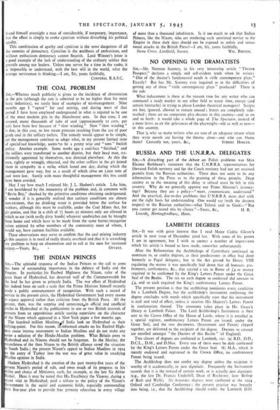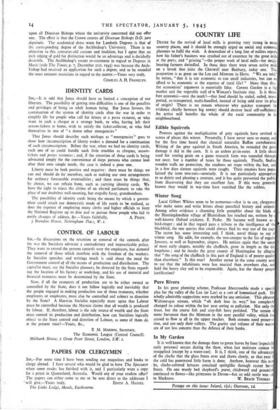LAMBETH DEGREES
Sta,—It was with great interest that I read Major Cedric Glover's article in your issue of December 22nd last. With some of his points I am in agreement, but I wish to correct a number of impressions which his article is bound to have made, somewhat unfortunately.
After the Reformation the Archbishops of Canterbury continued to nominate to, or confer degrees, as their predecessors in office had done formerly as Papal delegates, but in the Act passed by Henry VIII regulating the matter it was specifically laid down that all honours, pre- ferments, conferments, &c., that carried a tax to Rome of ,C4 or money required to be confirmed by the King's Letters Patent under the Great Seal of the Realm. The tax on each degree so conferred did amount to £4, and so each required the King's confirmatory Letters Patent.
The present position is that the archbishop nominates every candidate for a Lambeth Degree, but the archbishop's instrument conferring the degree concludes with words which specifically state that his instrument is null and void of effect, unless it receives His Majesty's Letters Patent in confirmation thereof. The ceremony takes place in His Grace's library at Lambeth Palace. The Lord Archbishop's Instrument is then sent to the Crown Office of the House of Lords, where it is enrolled in a special register, confirmatory Letters Patent are issued, under the Great Seal, and the two documents (Instrument and Patent) clipped together, are delivered to the recipient of the degree. Doctors so created are enrolled amongst " the Doctors of this Realm " (of England).
Two classes of degrees are conferred at Lambeth, viz: (a) B.D., D.D., D.C.L., D.M., and D.Mus. Every one of these must be duly confirmed by the King's Letters Patent under the Great Seal. (b) M.A., which is merely endowed and registered in the Crown Office, no confirmatory Patent being issued.
The Archbishop does not confer any degree unless the recipient is worthy of it academically, or jure dignitatis. Frequently the Instrument records that it is the reward of certain work, or is actually jure dignitatis (e.g., the late Dr. Francis Underhill, Dean of Rochester, later Bishop of Bath and Wells). No honorary degrees were conferred at the 1924 Oxford and Cambridge Conference ; the present practice was brought into being, i.e., that the Archbishop should confer the Lambeth D.D.
upon all Diocesan Bishops where the university concerned did not offer one. The effect is that the Crown creates all Diocesan Bishops D.D. jure dignitatis. The academical dress worn for Lambeth Degrees is that of the corresponding degree of the Archbishop's University. There is no objection to this centuries-old custom and tradition, but I agree that an inch edging of gold for distinction would be an advantage and is decidedly desirable. The Archbishop's recent re-statement in regard to Degrees in Music (vide The Times, p. 7, December zt st, 1943) was because the Arch- bishop had received an application for such a degree, and so he sounded the most eminent musicians in regard to the matter.—Yours very truly, CHARLES A. H. FRANICLYN.



























 Previous page
Previous page